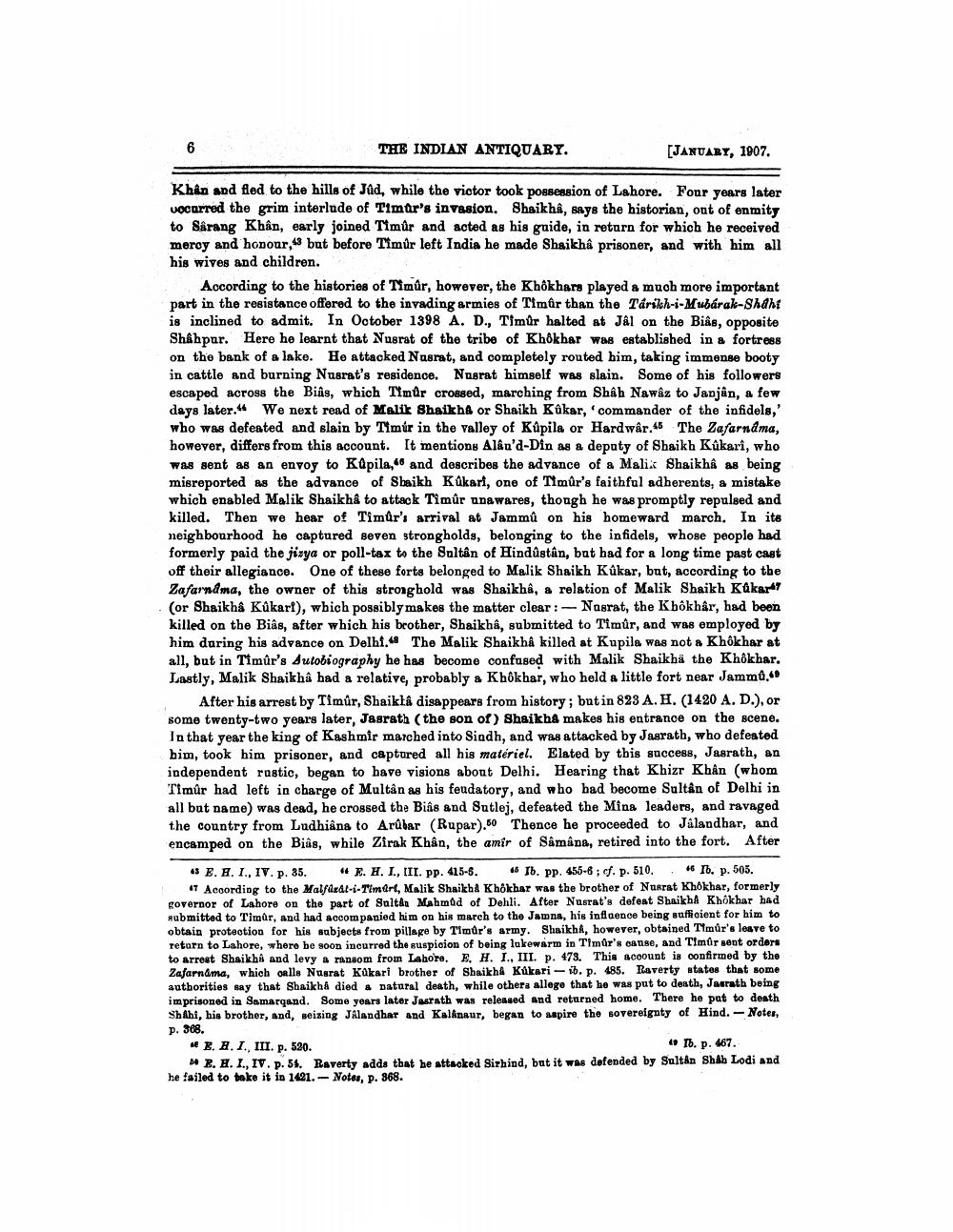________________
6 PE
THE INDIAN ANTIQUARY.
[JANUARY, 1907.
Khan and fled to the hills of Júd, while the victor took possession of Lahore. Four years later vocarred the grim interlude of Timar's invasion. Shaikhâ, says the historian, ont of enmity to Sarang Khân, early joined Timûr and acted as his guide, in return for which he received meroy and honour, but before Timûr left India he made Shaikhâ prisoner, and with him all his wives and children.
According to the histories of Timûr, however, the Khôkhars played a much more important part in the resistance offered to the invading armies of Timêr than the Tarikh-i-Mubarak-Shahi is inclined to admit. In October 1398 A. D., Timur halted at Jal on the Biâs, opposite Shahpur. Here he learnt that Nusrat of the tribe of Khokhar was established in a fortress on the bank of a lake. He attacked Nasrat, and completely routed him, taking immense booty in cattle and burning Nusrat's residence. Nusrat himself was slain. Some of his followers escaped across the Biâs, which Timur crossed, marching from Shah Nawaz to Janjân, a few days later. We next read of Malik Shaikhs or Shaikh Kûkar, commander of the infidels,' who was defeated and slain by Timur in the valley of Kúpila or Hardwâr.46 The Zafarndma, however, differs from this account. It mentions Alau'd-Din as a deputy of Shaikh Kůkarî, who was sent as an envoy to Kúpila, 6 and describes the advance of a Malik Shaikhê as being misreported as the advance of Shaikh Kükari, one of Timûr's faithful adherents, a mistake which enabled Malik Shaikhå to attack Timûr unawares, though he was promptly repulsed and killed. Then we hear of Timur's arrival at Jammû on his homeward march. In its neighbourhood he captured seven strongholds, belonging to the infidels, whose people had formerly paid the jizya or poll-tax to the Snltân of Hindústân, but had for a long time past cast off their allegiance. One of these forts belonged to Malik Shaikh Kúkar, but, according to the Zafarndma, the owner of this stronghold was Shaikhâ, a relation of Malik Shaikh Kakar? (or Shaikha Kukar), which possibly makes the matter clear:- Nasrat, the Khokhar, had been killed on the Biâs, after which his brother, Shaikha, submitted to Timûr, and was employed by him during his advance on Delhi. The Malik Shaikhâ killed at Kupila was not a Khokhar at all, but in Timûr's Autobiography he has become confused with Malik Shaikha the Khôkbar, Lastly, Malik Shaikhâ had a relative, probably a Khokhar, who held a little fort near Jamm0.69
After his arrest by Timur, Shaiktá disappears from history; but in 823 A. H. (1420 A. D.), or some twenty-two years later, Jasrath (the son of) Shaikha makes his entrance on the scene. In that year the king of Kashmir marched into Sindh, and was attacked by Jasrath, who defeated him, took him prisoner, and captured all his matériel. Elated by this success, Jasrath, an independent rustic, began to have visions about Delhi. Hearing that Khizr Khân (whom Timûr had left in charge of Multân as his feudatory, and who had become Sultan of Delhi in all but name) was dead, he crossed the Bias and Sutlej, defeated the Mina leaders, and ravaged the country from Ludhiana to Arubar (Rupar).50 Thence he proceeded to Jalandhar, and encamped on the Biâs, while Zirak Khân, the amir of Sâmâna, retired into the fort. After
* E. . I., IV. p. 35. "E. H. I., III. pp. 415-5. 5 lb. pp. 455-8; cf. p. 510. 46 Ib. p. 505.
17 Acoording to the Malfaedt-i-Timort, Malik Shaikh Khokhar was the brother of Nusrat Khokhar, formerly governor of Lahore on the part of Sultan Mahmud of Dehli. After Nusrat's defeat Shaikh Khokhar had submitted to Timur, and had accompanied him on his march to the Jamna, his influence being sufficient for him to obtain protection for his subjects from pillage by Timur's army. Shaikh, however, obtained Timûr's leave to retorn to Lahore, where be soon incurred the suspicion of being lukewarm in TimOr's cause, and Timor sont orders to arrest Shaikhs and levy a ransom from Labore, E. H. I., III. p. 473. This acoount is confirmed by the Zafarnama, which oalle Nugrat Kakari brother of Shaikha Kukari - ib. p. 485. Raverty states that some authorities say that Shaikh& died a natural death, while others alloge that he was put to death, Jasrath being imprisoned in Samarqand. Some years later Jasrath was released and returned home. There he put to death Shahi, his brother, and, reising JAlandhar and Kalinaur, began to aspire the sovereignty of Hind.-Notes, p. 368. . . I. III. p. 520.
" Ib. p. 467. MR. H. I., IV. p. 54. Raverty adds that he attacked Sirhind, but it was defended by Sultan Shah Lodi and he failed to take it in 1421. - Notes, p. 868.




